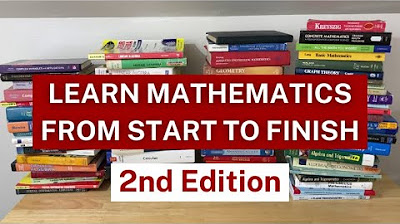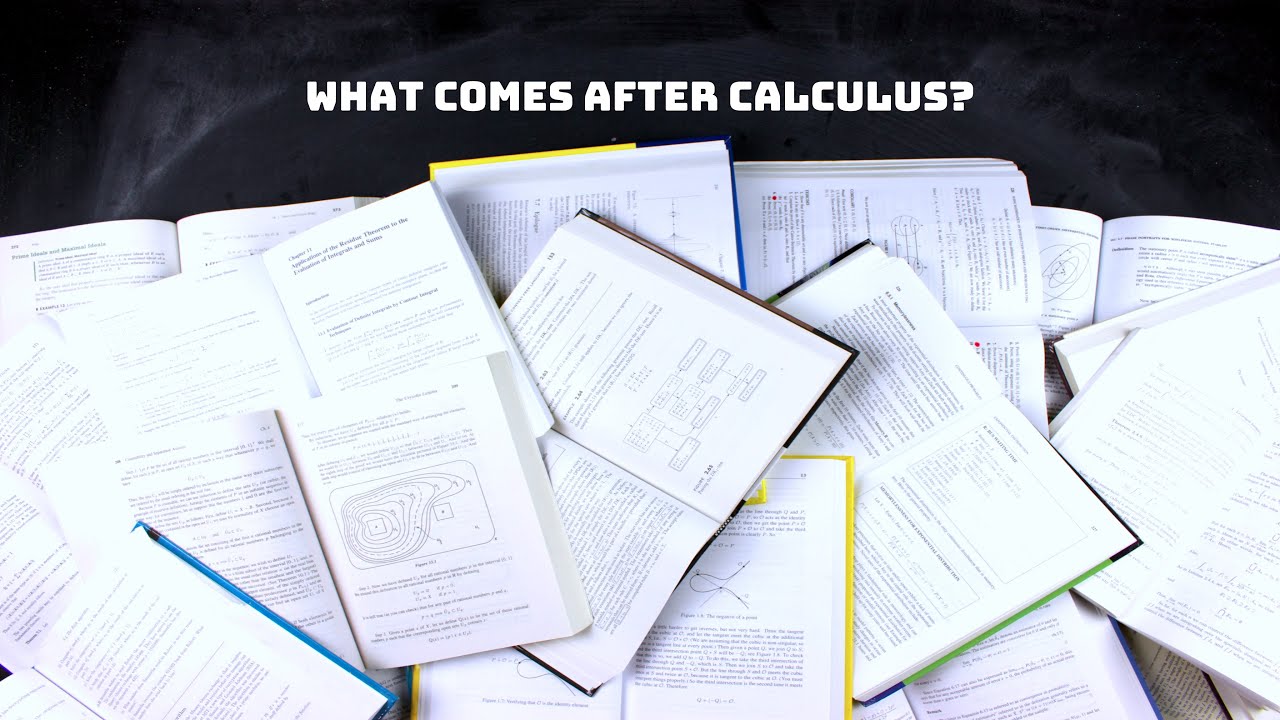All the Math Classes that Math Majors Take
TLDRIn this video, the speaker shares an extensive list of textbooks used throughout their Bachelor's in Mathematics, offering insights into the expected curriculum for math majors. The books cover a range of subjects including Calculus, Physics, Logic and Proof, Mathematical Statistics, Differential Equations, Linear Algebra, Complex Variables, Abstract Algebra, and Topology. The speaker provides personal experiences and recommendations, highlighting the difficulty and importance of each course in the math major journey.
Takeaways
- 📚 A mathematics major typically involves a variety of courses, each with its own set of textbooks.
- 📈 'Calculus' by James Stewart is a widely used and recommended book for learning calculus, despite its challenging nature.
- 📖 Physics is also a part of the mathematics curriculum, with 'Physics for Scientists and Engineers' by Surway and Jewett being a popular choice.
- 📝 'Logic and Proof' by Norman Sherwood and Barr, as well as 'Abstract Math' by Bond and Keen, are recommended for learning proof writing.
- 📊 'Mathematical Statistics' by Wackerly, Mendenhall, and Schaefer is a rigorous and challenging textbook used for mathematical statistics courses.
- 🔢 'Elementary Linear Algebra and Matrices' by Karen雨伞 is praised for its beginner-friendly approach to computational linear algebra.
- 📂 'Advanced Linear Algebra' by Friedberg, Insel, and Spence is a comprehensive and rigorous text used for a more advanced study of linear algebra.
- 🔍 'Differential Equations' by Saf and Snyder is a good choice for learning about ordinary differential equations.
- 📊 'Combinatorics and Graph Theory' by Grimaldi is a tough but rewarding book for these specialized topics.
- 🌐 'Complex Variables' by Saf and Snyder is a beginner-friendly book for the study of complex numbers and functions.
- 🔧 'Abstract Algebra' by Saracino is considered one of the best beginner books for abstract algebra, often taken after linear algebra.
- 🔍 'Elements of Point Set Topology' by John D. Baum is a recommended book for studying topology, especially when taken later in one's mathematical studies.
Q & A
What calculus book was used by the speaker for their courses?
-The speaker used 'Calculus' by James Stewart for their Calc One, Two, and Three courses.
How did the popularity of James Stewart's calculus book contribute to his wealth?
-James Stewart became a multi-millionaire due to the popularity of his calculus book, which is widely used and has been a significant source of income.
Which physics textbook did the speaker use for their courses?
-The speaker used 'Physics for Scientists and Engineers' by Surway and Jewett for their physics courses.
What is the significance of the book 'Logic and Proof' in the speaker's math studies?
-The book 'Logic and Proof' by Norman Sherwood and Barr is significant as it was used for an introductory course on writing proofs, which is a crucial skill for math majors.
Why did the speaker switch to 'Abstract Math' by Bond and Keen for learning proofs?
-The speaker switched to 'Abstract Math' by Bond and Keen because it jumps more directly into formal proofs compared to 'Logic and Proof', which takes longer to get to the formal proofs.
How did the speaker describe their experience with 'Mathematical Statistics' by Wackerly, Mendenhall, and Schaefer?
-The speaker described their experience with 'Mathematical Statistics' as challenging, noting that it's a tough course and they initially dropped the class but later managed to get Bs in both parts of the course.
What is the difference between 'regular statistics' and 'mathematical statistics' as mentioned by the speaker?
-Regular statistics is less rigorous, while mathematical statistics is calculus-based and more hardcore, involving axioms and a different way of thinking that combines proofs, calculus, and statistics.
Which book did the speaker use for their course on differential equations?
-The speaker used the book by Saf and Snyder for their ordinary differential equations course.
How did the speaker's experience with 'Abstract Algebra' by Saracino influence their view on the subject?
-The speaker found 'Abstract Algebra' by Saracino to be their favorite book and the best beginner book for the subject, having read it extensively and done almost every exercise during their studies.
What advice does the speaker give regarding the timing of taking the 'Topology' course?
-The speaker advises taking the 'Topology' course near the end of one's math degree, as they found it easier after having taken more advanced math classes.
What was the speaker's overall impression of the book 'Elements of Point Set Topology' by John D. Baum?
-The speaker had a positive impression of 'Elements of Point Set Topology' by John D. Baum, considering it an excellent book for the subject, despite its initial introduction of topologies being different from the standard definition.
Outlines
📚 Mathematics Degree: Textbooks Overview
The speaker introduces the textbooks used during their Bachelor's in Mathematics, highlighting the variety of books across different math courses. They discuss the popularity and quality of the calculus book by James Stewart, the physics textbook by Surway and Jewett, and the importance of learning physics in a math major. The speaker also mentions the challenges of finding certain textbooks and suggests alternatives, emphasizing the value of books for learning proof writing and mathematical statistics.
📈 Advanced Math Courses and Textbooks
This paragraph delves into more advanced math courses such as differential equations, discrete math, combinatorics, graph theory, linear algebra, and complex variables. The speaker shares their experiences with the textbooks and courses, noting the difficulty levels and the utility of the books for understanding the subjects. They express their preference for certain books over others and provide insights into the nature of the courses, such as the computational focus of one linear algebra book and the rigorous approach of another.
🎓 Challenging Math Major Courses and Resources
The speaker discusses the most challenging courses in a math major, including abstract algebra, advanced calculus, and topology. They share their personal experiences, such as the difficulty of transitioning to proof-based courses and the struggle with advanced calculus. They recommend specific textbooks for these courses, highlighting the comprehensive nature of some books and the beginner-friendly approach of others. The speaker concludes by suggesting that certain courses, like topology, should be taken later in a math degree due to their complexity.
Mindmap
Keywords
💡Math Degree
💡Calculus
💡Physics
💡Writing Proofs
💡Mathematical Statistics
💡Differential Equations
💡Discrete Math
💡Linear Algebra
💡Partial Differential Equations
💡Complex Variables
💡Abstract Algebra
💡Advanced Calculus
💡Topology
Highlights
Overview of books used for a Bachelor's in Mathematics.
Calculus textbooks by James Stewart, a popular and widely-used choice.
Inclusion of physics books, specifically for scientists and engineers by Surway and Jewett.
Introduction to writing proofs with 'Logic and Proof' by Norman Sherwood and Barr.
Recommendation of 'Abstract Math' by Bond and Keen for proof writing.
Discussion on mathematical statistics and the book by Wackerly, Mendenhall, and Schaefer.
Mention of differential equations course and the book by Saf and Snyder.
Discrete math and combinatorics with the book by Grimaldi.
Linear algebra with 'Elementary Linear Algebra and Matrices' by Karen雨伞.
Advanced linear algebra with the book by Friedberg, Insel, and Spence.
Study of partial differential equations with the book by Stras.
Complex variables and complex analysis with the book by Safin and Snyder.
Abstract algebra with the book by Saracino.
Mathematical analysis with the book by Fitzpatrick.
Topology with 'Elements of Point Set Topology' by John D. Baum.
Personal experience and recommendations for course order.
Conclusion and summary of the math major's book list.
Transcripts
Browse More Related Video
5.0 / 5 (0 votes)
Thanks for rating:





